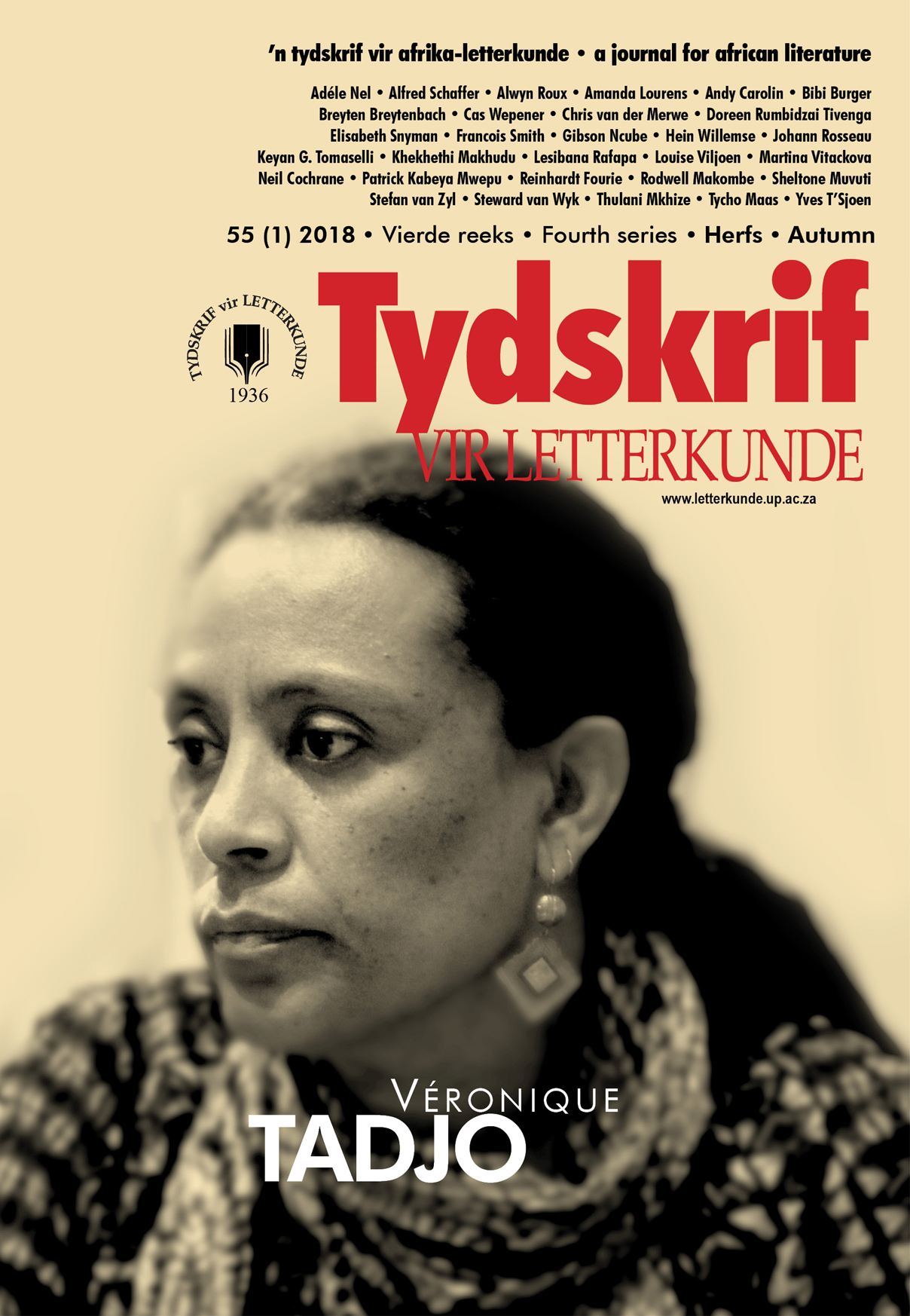Of dirt, disinfection and purgation: Discursive construction of state violence in selected contemporary Zimbabwean literature
DOI :
https://doi.org/10.17159/2309-9070/tvl.v.55i1.1548Mots-clés :
dirt, filth, disease, dissenting voices, state violence, power, nationalism, Zimbabwe, memory and belonging, discursive construction, Gukurahundi massacres, Operation MurambatsvinaRésumé
This paper examines post-independent Zimbabwean literary narratives which engage with how the ruling ZANU-PF government frames dissenting voices as constituting dirt, filth and undesirability. Making use of Achille Mbembe's postulations on the "vulgarity of power" and Kenneth W. Harrow's readings of the politics of dirt, the central thesis of this paper is that the troping of dirt and state sponsored violence are closely related to the themes of memory and belonging. Literary works by writers such as Chistopher Mlalazi, NoViolet Bulawayo and John Eppel become self-effacing speech acts that are involved in reimagining and revisioning our understanding of power dynamics and how this affects human and social experiences.
Téléchargements
Références
Adebanwi Wade. “The Writer as Social Thinker.” Journal of Contemporary African Studies, vol 32 no 4, 2014, pp. 405–20.
Alexander, Karin. “Orphans of the Empire: An Analysis of Elements of White Identity and Ideology Construction in Zimbabwe,” Zimbabwe: Justice and Political Reconciliation, edited by Brian Raftopoulous and Tyrone Savage, Institute for Justice and Reconciliation, 2004, pp.193–212.
Bhabha, Homi. “DissemiNation: Time, Narrative and the Margins of the Modern Nation.” The Blackwell Reader in Contemporary Social Theory, edited by Anthony Elliot, Blackwell, 1999, pp. 211–19.
Bhebe, Ngwabi and Terence Ranger. The Historical Dimensions and Human Rights in Zimbabwe. U of Zimbabwe Publications, 2001.
Bryce, Jane. “Survival is in the mouth: Interview with Yvonne Vera.” Sign and Taboo: Perspectives on the Poetic Fiction of Yvonne Vera, edited by Robert Muponde and Mandivavaira Maodzwa-Taruvinga, Weaver Press, 2002, pp. 217–26.
Bulawayo, NoViolet. We Need New Names. Chatto & Windus, 2013.
Chikhuwa, Jacob Wilson. A Crisis of Governance: Zimbabwe. Algora Publishing, 2004.
Coltart, David. The Struggle Continues: 50 Years of Tyranny in Zimbabwe. Jacana Media, 2016.
Decker, Alicia. “Idi Amin’s Dirty War: Subversion, Sabotage, and the Battle to Keep Uganda Clean. 1971–1979.” The International Journal of African Historical Studies, vol 43 no 3, 2010, pp. 489-513.
Dodgson-Katiyo, Pauline. “Telling Versions of the War: Vera and the War’s Legacy.” Emerging Perspectives on Yvonne Vera, edited by Helen Cousins and Pauline Dodgson-Katiyo, Africa World Press, 2012, pp. 101–20.
Douglas, Mary. Purity and Danger. An Analysis of Concept of Pollution and Taboo. Routledge, 1966.
Ellis, Robb W.J. Without Honour. CreateSpace, 2006.
Foucault, Michel. Discipline and Punish: The Birth of the Prison. Translated by Alan Sheridan. Vintage Books, 1995.
Harris, Ashleigh. “Discourses of Dirt and Diseases in Operation Murambatsvina.” The Hidden Dimensions of Operation
Murambatsvina, edited by Maurice Vambe, Weaver Press, 2008, pp. 40–52.
Harrow, Kenneth W. Trash: African Cinema from Below. Indiana U P, 2013.
Holquist, Michael. Dialogism: Bakhtin and His World. Routledge, 2002.
Hove, Chenjerai. Bones. Baobab Books, 1988.
Kristeva, Julia. “Women’s Time.” Signs, vol 7 no 1, 1981, pp. 13–35.
Kubatana Blogs. “It’s Official: The MDC Has Sold Out.” 2009. www.kubatanablogs.net/kubatana/its-official-the-mdc-has-sold-out/.
Lara, M. P. Moral Textures. Feminist Narratives in Public Sphere. Polity Press, 1998.
Mhanda, Wilfred. Dzino: Memories of a Freedom Fighter. Weaver Press, 2011.
Mlalazi, Christopher. Running with Mother. Weaver Press, 2012.
Ncube, Gibson. “Sexual/textual Politics: Rethinking Gender and Sexuality in Gay Moroccan Literature.” Journal of Contemporary African Studies, vol 32 no 4, 2014, pp. 476–90.
Ncube, Gibson and Gugulethu Siziba. “(Re)membering the Nation’s ‘Forgotten’ Past: Portrayals of Gukurahundi in Zimbabwean Literature.” Journal of Commonwealth Literature, vol 52 no 2, 2015, pp. 1–17, https://doi.org/10.1177/0021989415615646.
Ncube, Gibson, and Bridget Chinouriri. “Humour as Support and/or Opposition: Nicknaming Political Personalities and Movements in Post-independent Zimbabwe.” IGAMA: African Journal of Onomastics, vol 1 no 1, 2016, pp. 1–12.
Nyambi, Oliver. “Of Weevils and Gamatox: Titles, Names and Nicknames in ZANU PF Succession Politics.” African Identities, vol 14, no 1, 2016, pp. 59–73.
Phillips, Oliver. “‘Venus Monstrosa’ and ‘Unnatural Offences.’” Sociolegal Control of Homosexuality: A Multination Comparison, edited by James West Donald and Richard Green, Plenum Press, 1997, pp. 43–60.
Radio Africa. “Racial Discrimination in Zimbabwe: A Systematic Programme of Abuse.” 2012. http://nehandaradio.com/2012/11/30/racial-discrimination-in-zimbabwe-a-systematic-program-of-abuse-part-1/
Shoko, Tabona. “Worse Than Dogs and Pigs? Attitudes Toward Homosexual Practice in Zimbabwe.” Journal of Homosexuality, vol 57 no 5, 2010, pp. 634–49.
Siziba, Gugulethu and Gibson Ncube. “Mugabe’s Fall from Grace: Satire and Fictional Narratives as Silent Forms of Resistance in/on Zimbabwe.” Social Dynamics, vol 41, no 3, 2015, pp. 516–39.
Sontag, Susan. Illness as Metaphor and AIDS and its Metaphor. Penguin Books, 1991.
Tagwira, Valerie. The Uncertainty of Hope. Weaver Press, 2006.
Vera, Yvonne. The Prison of the Colonial Space: Narratives of Resistance. Diss. York U, Toronto, 1995.
Téléchargements
Publiée
Numéro
Rubrique
Licence
(c) Copyright Tydskrif vir Letterkunde 2018

Ce travail est disponible sous licence Creative Commons Attribution - Partage dans les Mêmes Conditions 4.0 International.


 https://orcid.org/0000-0001-6465-6584
https://orcid.org/0000-0001-6465-6584


.png)